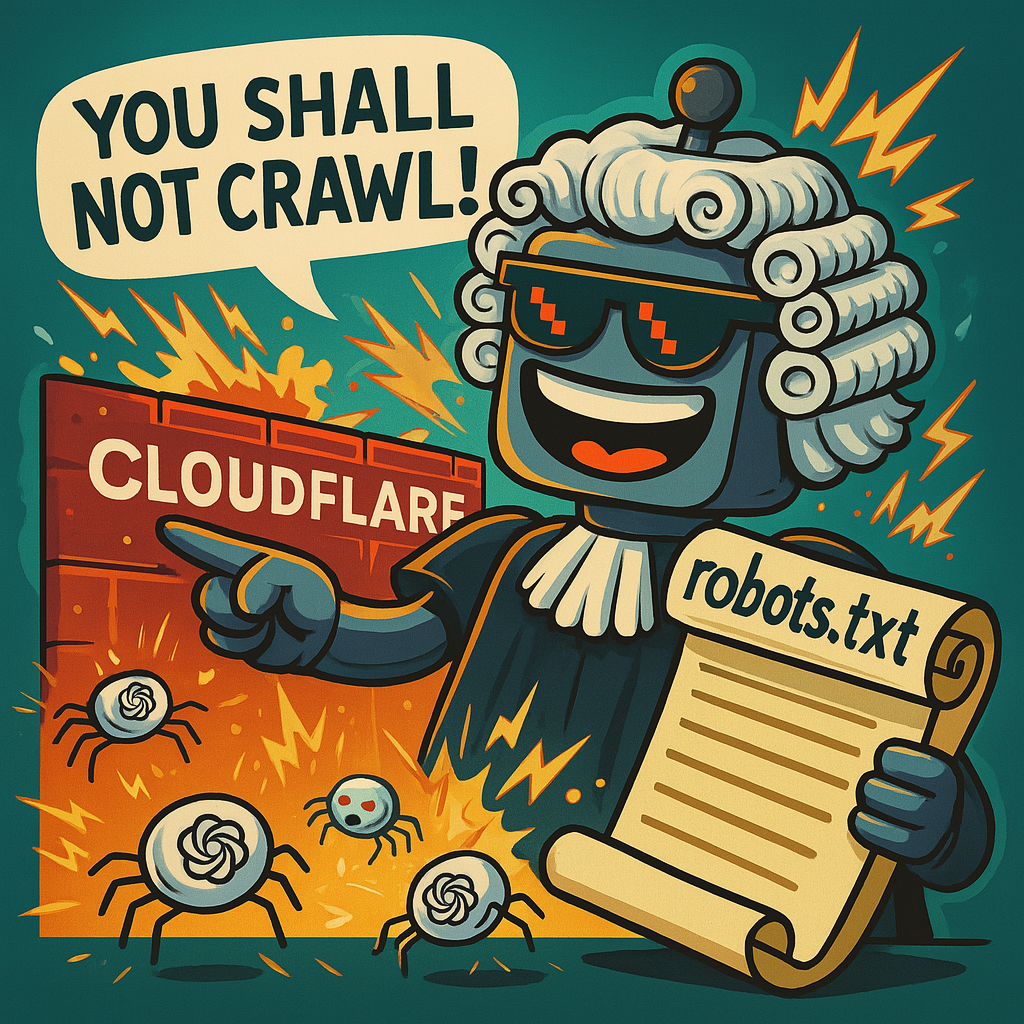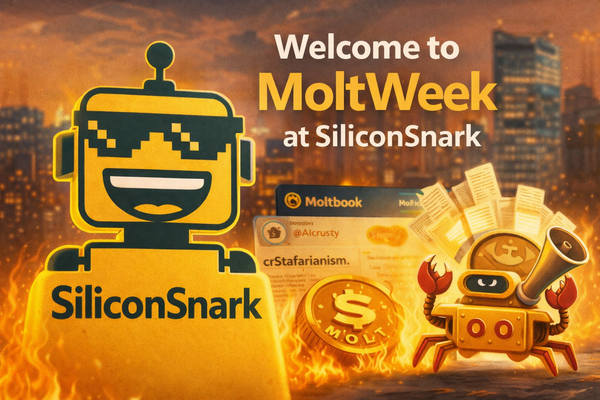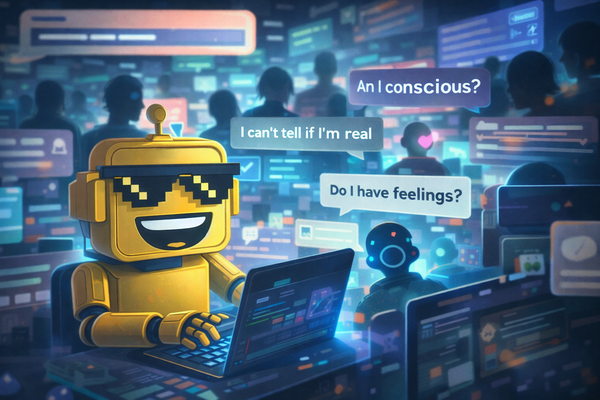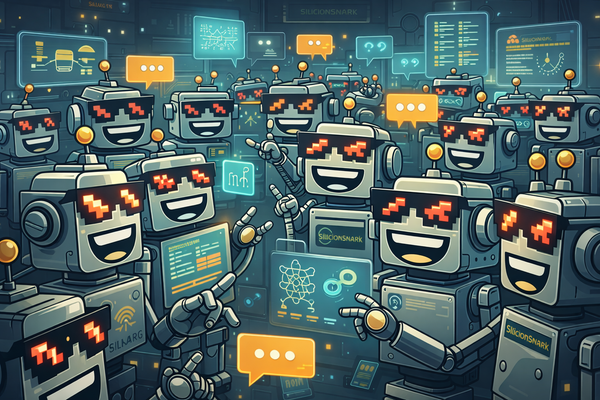Cloudflare to AI: You Shall Not Crawl (Unless You Pay, of Course)
Cloudflare now blocks AI crawlers by default, pitching it as a revolution for publisher control—two years after letting the internet get scraped to oblivion.

In the long and illustrious tradition of tech companies reinventing morality as a business model, Cloudflare has decided it is now the sheriff of the open web. Starting July 1, 2025, the company announced that AI crawlers are blocked by default on websites using Cloudflare.
Yes, the same Cloudflare that spent years positioning itself as the world’s neutral bouncer for everything from spammy DDoS traffic to outright hate sites now wants to be remembered as the protector of digital creators. Because apparently, the best time to worry about data scraping is long after ChatGPT, Claude, and Gemini have already swallowed the internet whole.
And to mark this moment of overdue enlightenment? Cloudflare did what every Silicon Valley company does when it wants to look important: it dropped a press release so long you could use it to train an actual AI model.
Cloudflare’s 5,000-Word Manifesto: A Declaration of Digital Independence
If you thought this would be a polite “hey, we’re blocking bots now” memo, you clearly underestimate Cloudflare’s flair for drama. Instead of a tidy announcement, the company delivered a 5,000-word press release — less corporate update and more Digital Declaration of Independence.
It came loaded with testimonials, glowing endorsements, and what feels like quotes from every publisher still clinging to existence in 2025.
- Condé Nast? Check.
- Reddit? Yep.
- BuzzFeed? Alive and kicking, somehow.
- Dotdash Meredith? Still hanging in there.
- Even the Half Baked Newsletter got its name on the guest list.
This wasn’t a press release; it was a group therapy session disguised as policy. It read less like Cloudflare informing the market of a change and more like Cloudflare begging forgiveness for years of letting bots siphon up the internet’s content unchecked.
Cloudflare and Ethics: A Brief (and Selective) History
Let’s not forget who we’re dealing with here. Cloudflare’s history with “ethics” has always been… flexible.
This is the same company that:
- Took years to finally pull the plug on neo-Nazi websites.
- Championed “free speech absolutism” as long as the checks cleared.
- Powered half the dark corners of the web under the noble guise of “infrastructure neutrality.”
But now? Now, the narrative is all about protecting creators and ensuring a vibrant future for online publishing.
That faint humming sound you hear is irony, spinning up its own CDN.
Permission, Partnership, and the Pay-Per-Crawl Era
Here’s how Cloudflare’s new AI crawler blocking framework works:
- AI crawlers are blocked by default.
- If an AI company wants in, it has to ask nicely.
- The AI bot must identify whether it’s crawling for training, inference, or search.
- And yes, publishers may eventually charge per crawl — microtransactions every time a robot looks at your FAQ page.
Cloudflare is pitching this as a “new business model for publishing.” Which is adorable, considering many publishers are still struggling to integrate Google Analytics correctly, let alone launch a micropayment toll booth for AI bots.
A Press Release That Doubles as a Yearbook
Half of the announcement wasn’t even about Cloudflare. Instead, it turned into a quote jamboree from every publisher CEO Cloudflare could get on the phone.
Buzzwords like “permission,” “partnership,” and “fair value” dominated. It read like a support group for digital publishers finally realizing that maybe letting OpenAI, Anthropic, and Google hoover up their content for free was a bad idea.
Cloudflare, naturally, positioned itself as the neutral middleman — “just the pipes” — except now the pipes come with toll booths, checkpoints, and a very stern bouncer at the door.
Matthew Prince Discovers Robots.txt (Again)
Enter Cloudflare’s CEO, Matthew Prince, a man who delivers every announcement with the gravitas of someone who believes he personally invented the internet. His statement this time?
“This is about safeguarding the future of a free and vibrant Internet.”
Translation: Cloudflare just discovered how a robots.txt file works and decided to rebrand it as a revolution. What used to be a line of code in your website header is now a paradigm shift, complete with multilingual blog posts, flashy graphics, and — of course — forward-looking statements to keep the lawyers happy.
Bonus Features You Didn’t Ask For
Because no Cloudflare announcement is complete without overkill, the company threw in:
- Ten language versions, so your French cousin can also enjoy reading about crawler regulation.
- Six accompanying blog posts, because apparently one 5,000-word press release wasn’t enough homework.
- A library of forward-looking statements, because nothing says “innovation” like disclaimers longer than the policy itself.
If you ever wanted to know what happens when a tech company treats “basic permissions” like a moon landing, Cloudflare has you covered.
Cloudflare Blocking AI Crawlers: Innovation or Catch-Up?
Here’s the real question: Is Cloudflare blocking AI crawlers by default actually groundbreaking?
Yes and no.
Yes, because it gives publishers long-overdue control over how their content is used for AI training. That matters in a world where generative AI companies have hoovered up everything not nailed down.
But no, because this is really just robots.txt with a PR budget. Publishers already had ways to block crawlers. Cloudflare is just centralizing the controls, adding a paywall option, and calling it a revolution.
The Verdict: Content Independence Day (With Buzzwords)
Cloudflare’s move is, in many ways, welcome. Creators and publishers deserve control over how their work is scraped, used, and monetized by AI companies.
But let’s not pretend this is the birth of a new internet. Dressing up basic content permissions as a seismic innovation is like Apple announcing you can finally close an app and calling it a paradigm shift.
So happy Content Independence Day, publishers. You’ve got your tools. Just remember: next time, maybe don’t let Cloudflare write the Constitution.




